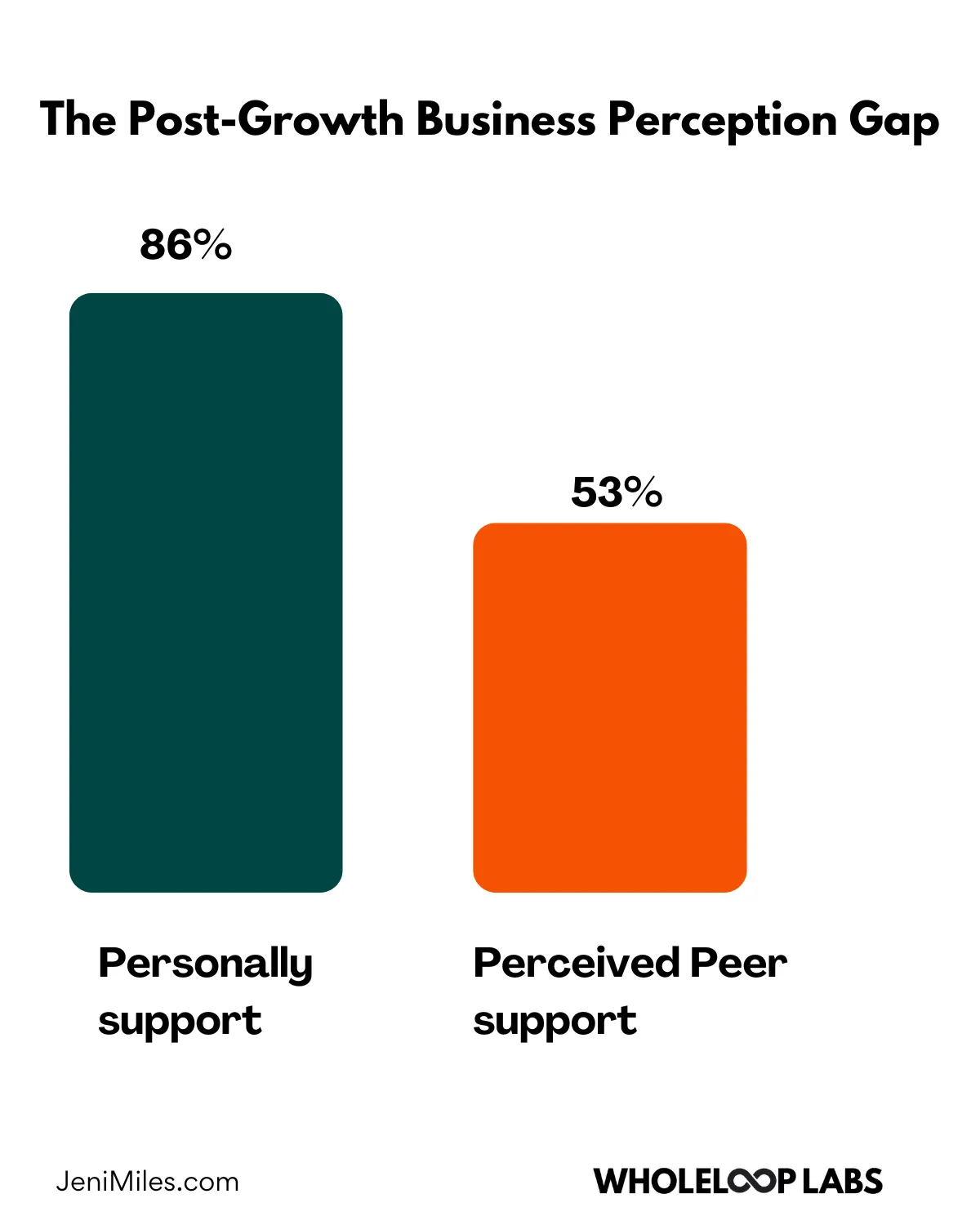From Google to Post-Growth & What 400+ Professionals Taught Me About Corporate Sustainability
.webp)
New London School of Economics study reveals a surprising truth: most business professionals support sustainable transformation yet drastically overestimate peer opposition to these post-growth business practices
The Cognitive Dissonance That Changed Everything
I returned to Google after maternity leave in 2021, questioning everything we'd normalised about how we live and work. My understanding of systems of oppression and resulting planetary overshoot was no longer purely intellectual. I began to feel with each breath the visceral disconnect between everyday business objectives and the fact of living in humanity's most decisive decade in millennia.
I left exactly a year ago, in June 2024, unsure of how to personally meet this moment but certain I shouldn't spend it identifying new revenue opportunities for platform giants as inequality soared.
While peers praised my courage for rejecting the impossible juggle of work and motherhood, this social and ecological context wasn't something I had felt comfortable voicing until my final leaving email:
"The interconnected crises of escalating emissions, inequality and breached planetary boundaries (upon which all life depends!) have motivated me to seek new paths in both my personal and professional life" -- My Google leaving email, June 2024
What began as a personal crisis of purpose has since evolved into empirical research exploring whether other executives in the business world support similar transformation.
What was certain, however, was that my employer Alphabet's operational carbon emissions had more than doubled between 2020 and 2023, part of a broader pattern where even well-intentioned tech companies externalise enormous costs onto workers, communities, ecosystems and future generations. The timing feels particularly stark now: 2024 became the first year to breach 1.5°C above pre-industrial levels, whilst AI's growing data centre electricity demand is projected to more than double by 2030, largely powered by fossil fuels.
Was I alone in this awakening? And how might business truly confront our planetary reality beyond greenwashing? These questions became the catalyst for research with Dr Dario Krpan and Dr Fred Basso at the LSE's PBS Post-Growth Transformation Lab.
Business Is THE Leverage Point
Governments are constrained by short-term political cycles. Consumers are trapped by the limits of individual action. But business?
According to arkH3's Theory of Change, businesses occupy a unique position with financial privilege (financial security), the means (budgets), the platform and audience (public visibility, access to media and the ear or key stakeholder groups, such as investors), influence or power over other key stakeholder groups (especially governments, consumers) and access to multiple potent levers (power over a system’s goals, power over a system’s rules, and so forth).
The real question isn’t whether change is needed, but what’s preventing individuals within companies from driving change, and how do we address those barriers?
The Research
We surveyed 409 UK business professionals in March 2025 to understand professionals' support for sustainable business transformation and barriers/enablers to making this a reality.
Our study combined two powerful frameworks: Jennifer Hinton's five post-growth business dimensions (size & scope, strategy, governance, incorporation structure, and relationship to profit) with the COM-B model of behaviour change, which examines the Capability, Opportunity, and Motivation needed for behaviour to occur.
What we discovered surprised us:
The Hidden Business Majority: Three Critical Findings
1. The Post-Growth Perception Gap
86% of respondents support post-growth business practices yet they believe only around half of their peers do. That 33-point perception gap reveals a quiet consensus and a powerful opportunity for change.
This isn’t about convincing people that change is needed. The conviction already exists. Instead, we’re seeing “pluralistic ignorance” where everyone privately holds the same view but assume this view is divisive or in the minority.

2. The Support-Action Divide
Over 90% of UK business professionals believe companies should follow Doughnut Economics principles (operating within planetary boundaries whilst meeting human needs). Yet 80% say it's challenging to get the business world to take meaningful environmental action.
3. The Education Paradox
Surprisingly, higher levels of education correlate with lower support for sustainable business models that reinvest profits for social good. Schools and universities may be entrenching outdated growth-first thinking rather than preparing leaders for sustainable transformation.
Post-Growth Business Principles Isn't Radical. It's Remembered
Post-growth business thinking isn’t utopian or academic. For most of human history, thriving economies functioned without endless growth imperatives. Indigenous and community-led systems prioritised balance, mutual care and ecological limits, principles now recognised as essential for regenerative business models. Listen to my conversation with Design Reparations co-founder Cecilia Scolaro on how non-extractive approaches to exchange have existed throughout time (listen to the full podcast episode):
The post-growth lens simply restores business to its rightful role: a tool for collective wellbeing, not shareholder extraction.
Implementing Sustainable Business Transformation: Practical Steps for Organisations
People don't need convincing that they should support a paradigm where post-growth business practices take precedence over profit extraction.. We need to make the hidden majority visible, reduce isolation and lower the perceived risk of implementing regenerative business practices.
Reveal sustainable business support: Run internal surveys or team reflections that surface the real appetite for transformation.
Create innovation sandboxes and safe zones for pilots: Test post-growth approaches in departments or regions, where teams can experiment without pressure to perform on conventional financial metrics.
Rewire business education: Rethink internal training and partnerships with universities to embrace systems thinking, Doughnut Economics and regenerative business design.
From Research to Reality
Download the full research report:
Register interest in the upcoming Post-Growth Accelerator, a new pilot cohort online programme helping forward-thinking employees and founders learn post-growth principles and diagnose barriers preventing transformation in their business.
Follow me on Linkedin or set up a discovery call to discuss how I can support you and your team.

.png)
